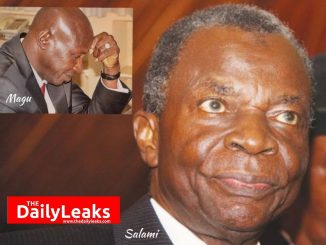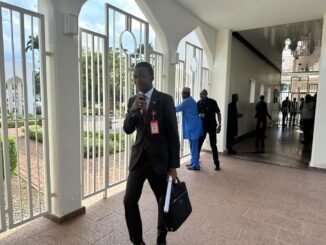
In recent developments, Yahaya Bello, a former Nigerian governor, has found himself embroiled in a controversy following allegations from the Economic and Financial Crimes Commission (EFCC) accusing him of misappropriating a substantial N80 billion in public funds during his tenure.
This unfolding saga from the immediate past Kogi State governor melo drama prompts a profound reflection on the integrity expected of public officeholders and the inherent responsibilities associated with such esteemed positions.
Bello at a time boastfully referred to himself as a “White Lion” suggestive of his self imposed strongmanliness depicting of a lion’s strength. On different occasions, videos have trended on social media, showcasing Bello displaying his herculean self under an intense excecutive work out sessions.
Now, with all the bravado, a simple invite from the EFCC to the former chief security officer of Kogi State to report to the commission to give account of his stewardship has turned a White Lion to a Panicking White Lion, he has suddenly become nervously, feeling threatened under self-inflicted pressure, now evading justice amid fear of EFCC. The world can now see a man formerly fearless in a position of power who is now struggling to maintain control in the face of legal scrutiny.
Public office incumbency necessitates an unwavering commitment to serving constituents, void of personal financial aggrandizement. Yet, regrettably, there are instances where individuals exploit their authority for personal gain, thereby breaching the trust bestowed upon them by the electorate.
It is imperative to underline the distinction between allegations and culpability. Every individual deserves the presumption of innocence until proven otherwise. However, Bello’s evasion of arrest and subsequent flight, rather than transparently confronting the accusations with legal representation, raises doubts regarding his professed innocence.
In cases where innocence is maintained, a proactive approach, engaging legal channels to refute allegations, is expected. By evading accountability, Bello inadvertently undermines his credibility and exacerbates suspicions surrounding his culpability.
Moreover, this evasion establishes a perilous precedent for future officeholders, suggesting that those in authoritative roles can circumvent accountability amidst allegations of malfeasance. Such a trend fosters public scepticism towards governance and perpetuates a culture of impunity.
ALSO READ: Falana sounds alarm over governors’ potential abuse of state police powers
According to data from the National Bureau of Statistics (NBS), the Federation Account Allocation Committee (FAAC) disbursed substantial sums to Kogi State between 2016 and 2023, with Yahaya Bello as the executive governor and chief security officer of his state managing the allocated funds as the principal signatory to the state account:
– 2016: ₦57.81 billion
– 2017: ₦72.22 billion
– 2018: ₦96.92 billion
– 2019: ₦93.54 billion
– 2020: ₦89.5 billion
– 2021: ₦95.89 billion
– 2022: ₦107.75 billion
– 2023: ₦136.97 billion
These figures underscore the significant responsibility entrusted to Bello during his tenure. So, why won’t he be interested in giving an account of his stewardship?
Still, amid mounting allegations and scrutiny, a new perspective emerges, casting a shadow of intrigue over Yahaya Bello’s evasion tactics. Adeola Adedipe, SAN, a member of Bello’s legal team, stepped into the spotlight, revealing a startling revelation. Despite Bello’s proclaimed bravery as a “white lion,” there lurked a fear, a fear so palpable that it drove him to evade accountability, to shun the very courts where justice is sought.
This revelation begs a compelling question: why would a man who once likened himself to a fearless lion cower in the face of arrest and accountability? Is a lion truly afraid of anything?
Adedipe’s plea for the revocation of the exparte order of arrest, citing procedural irregularities, adds another layer of complexity to the narrative. It paints a picture of a man trapped between the scales of justice and the shackles of fear, his once-bold roar now reduced to a whispered plea for reprieve.
As the saga unfolds, the public is left to ponder the enigma of Yahaya Bello: a man who once wielded power with bravado now dances on the edge of uncertainty, his legacy hanging in the balance.
In this gripping tale of intrigue and evasion, one thing remains clear: the integrity of public office stands as an unyielding pillar, impervious to the whims of fear and self-preservation. As the spotlight shifts, the world watches with bated breath, awaiting the resolution of Yahaya Bello’s fate and the lessons it may impart on the tapestry of governance.
These developments prompt a critical question: why would a public office holder, who once dubbed himself a “white lion,” fear arrest and accountability in his stewardship? Is a lion afraid of anything?
In conclusion, the tenure of public office should serve as a platform for principled service and accountability, rather than personal enrichment. While allegations warrant scrutiny, due process and the presumption of innocence must prevail.
The unfolding events concerning Yahaya Bello serve as a poignant reminder of the imperative to uphold these principles in our collective pursuit of a just and transparent society.
In the latest noteworthy revelation, the Chairman of the Economic and Financial Crimes Commission (EFCC), Ola Olukoyede, has brought to light an alleged misuse of public funds by the embattled former governor of Kogi State, Yahaya Bello. According to Olukoyede, Bello reportedly withdrew a staggering $720,000 from government coffers to facilitate advance payment for his child’s school fees, utilizing the services of a Bureau de Change.
Furthermore, in a dramatic turn of events, EFCC officials attempting to investigate the matter were met with significant resistance upon arriving at Bello’s residence. A formidable security presence, comprising over 30 armed policemen and 10 Counter Terrorist Unit personnel, obstructed their access, highlighting the complexities surrounding the investigation into Bello’s financial activities.
This revelation adds another layer to the ongoing scrutiny surrounding Bello’s tenure as governor and underscores the importance of accountability and transparency in governance. Stay tuned as this story continues to unfold.




